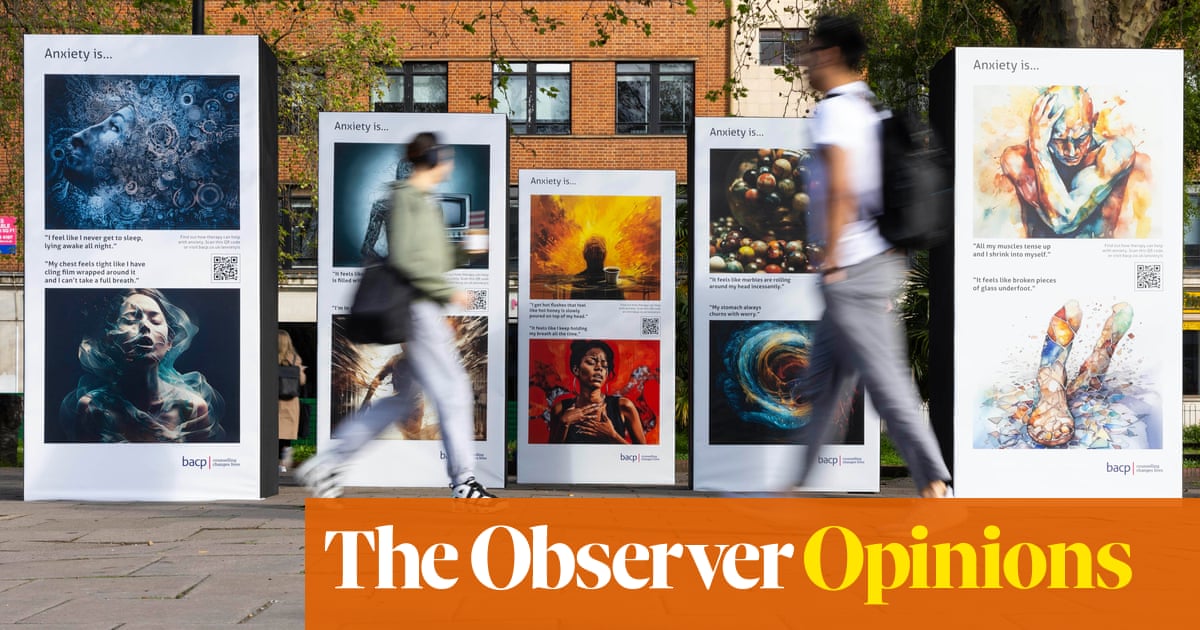
hen Julie Blackburn was diagnosed with post-traumatic stress disorder in 2016 she was told to avoid her triggers, scenarios which cause upsetting flashbacks. “But when your trigger is rain, there is no getting over it,” she said. “My husband and I don’t sleep when it’s raining, we take it in turns to stand at the window watching the rain – it’s just living in constant fear.”
Blackburn’s house in Old Coulsdon, Croydon, has been flooded several times, first in 2000 when heavy rain overwhelmed the Victorian sewer system and filled her home with toxic waste. Rapid development and poor infrastructure led the south London borough to be rated the fourth worst area in England and Wales for surface water flooding in 2011.
“You wouldn’t believe how long it takes to get over a flood. And I wouldn’t wish anyone to experience it,” said Blackburn, 52, who spends one to three hours a day on flood campaigning once she has finished work as a Cad technician.
Even two decades on from the first major flood at the property, Blackburn struggles to feel comfortable inviting people over and fears leaving the house for too long. When they were away over the summer and the street flooded, neighbours had to deploy their sandbags.
“It’s not just a little bit of water in your house, it’s the whole knock-on effect,” Blackburn said. “Mental health illness is still a taboo so perhaps it’s just not spoken about.”
Research from the University of York and the Centre for Mental Health found people who have been flooded in the UK are nine times more likely to experience long-term mental health problems than the general population. PTSD was the most commonly reported condition, with a prevalence rate of between 7.06% and 43.7%. Anxiety and depression were also common.
The report, which examined studies on flooding events in the UK from 1968 to 2016, found people affected by flooding experienced anxiety during heavy rain even years after being flooded. Symptoms included stress, sleep problems, panic attacks, nightmares, anger, mood swings and increased use of alcohol, prescription drugs or antidepressants.
“We clearly need to think about longer term deployment of resources to areas that have been affected by flooding,” said Andy Bell, the deputy chief executive at the Centre for Mental Health. “For many people, mental health impacts may be felt years after the event but they’re just as serious.”
Nikki Stocks, 59, lives in Todmorden, Calderdale, an area in West Yorkshire that has been particularly hit by floods in recent years – some residents have been flooded six times in the last five years. “You’re living on a knife edge, and it doesn’t ever seem to settle,” she said. “You don’t want to be reminded, you don’t want sandbags at your door all the time, but that’s how we live here.”
She lives alone and is disabled, receiving her income through benefits, so has struggled to get her house repaired completely from when it was last flooded in 2015. “I can’t get loans to get it done all in one go, it’s just a slow process of saving a bit of money and then getting a bit of work done,” she said. Living with depression and PTSD, Stocks has relied heavily on the local charity Healthy Minds Calderdale over the years. “I feel like they saved my life,” she said.
Lou Birks, the charity’s team lead for the area, said they launched a flooding project focused on bringing the community together so those affected could support each other. “We do support groups for people who want to just get stuff off their chest, and one-off workshops, for example on managing anxiety.
“Every time it rains consistently, heavily, people’s anxiety levels go up. This is the climate we live in. It’s almost like a rolling programme of newly anxious people as we continue to get flooded.”
Another Todmorden resident who has been flooded, Paul O’Reilly, said he experienced “massive anxiety attacks” during the storms in February this year, even though the water only came up to his back garden.
“I get anxiety attacks when I read weather forecasts that predict awful weather. The threat of floods and heavy storms are triggers for me,” said the 67-year-old. “I used to think rain was a bloody nuisance, but then it became an enemy.”
Dr Joana Cruz, a research associate at the University of York who led the study, said as the climate crisis increases the frequency and strength of storms, “we must provide tools for these communities to build resilience prior to flooding”. She added that more research on the issue is needed, particularly looking at the impact of flooding on people from minority ethnic backgrounds.
The study also showed displacement and loss of a sense of place and home were common factors that underscored mental health problems related to flooding, even up to a year afterwards.
O’Reilly, whose ground floor was gutted and rebuilt after floods in 2000 and then repaired and redecorated again after 2012 floods, said: “It’s like a major invasion of your privacy, it’s something that comes as a shock to the system that you’ve never experienced before.”
With the added stress of coronavirus, O’Reilly has found this year particularly tough, but like many he has found solace in sharing his burden with people around him. “I’ve always been a self-reliant person, but you have to swallow it and say you need help sometimes, and I’m glad it’s been there when I needed it,” he said.
For Stocks, she hopes that greater awareness of the mental health repercussions of flooding will encourage people to come forward: “It’s got to be talked about, even though it stresses me and I get upset, because if it isn’t talked about, it gets buried and people think they’re on their own.”












